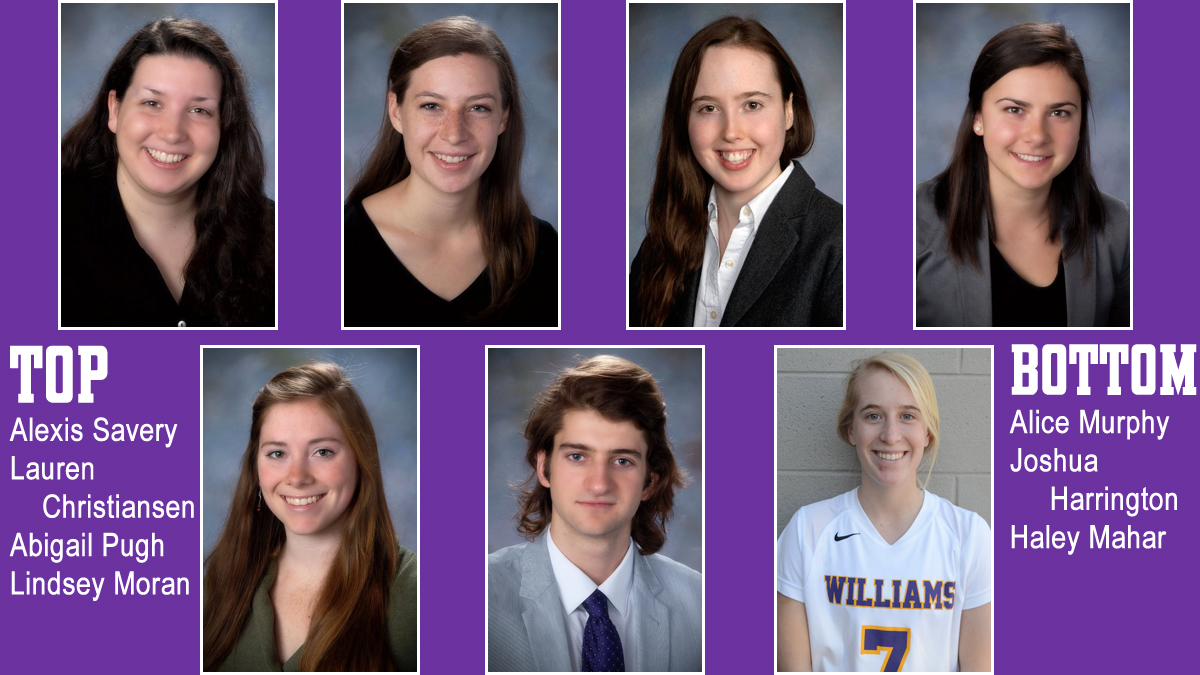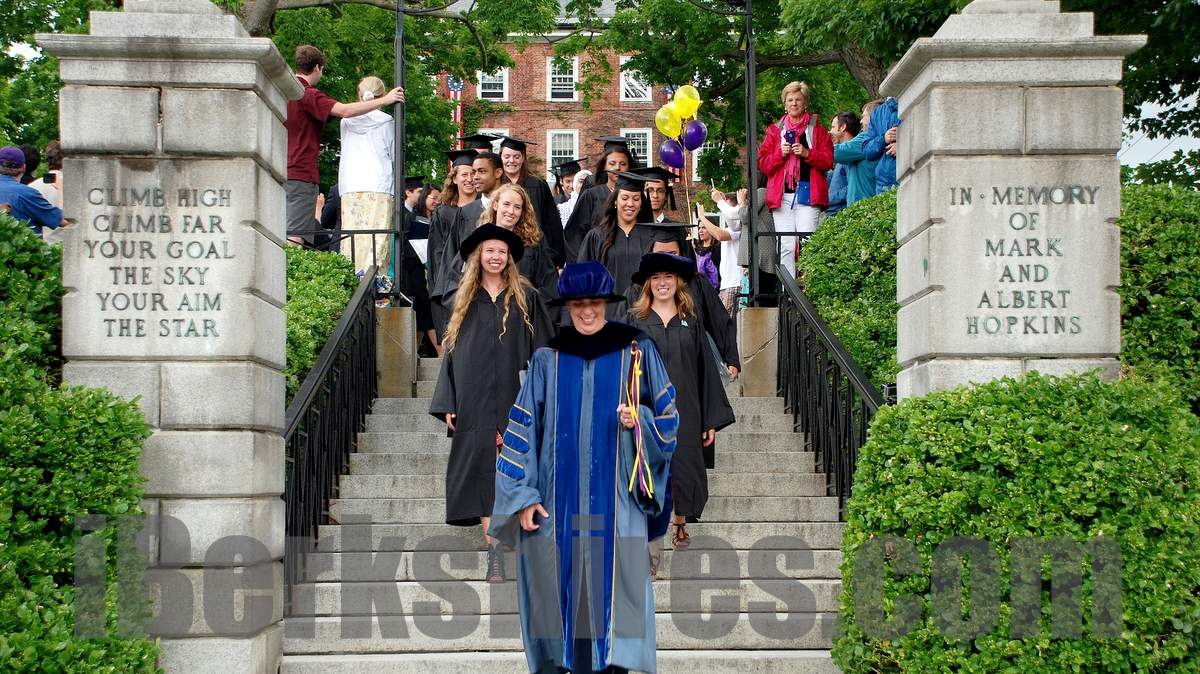Social Justice Stressed at Williams Commencement
WILLIAMSTOWN, Mass. — Social change and children's books were themes that ran through the 227th commencement exercises at Williams College.
The college graduated 538 undergraduates in a ceremony threatened by heavy rain Sunday morning but conducted on the college's West Lawn with only a minor sprinkle to detract from the speakers.
The principle speaker, Bryan Stevenson, challenged the newly minted grads to use their Williams education to better the lives of those around them and to surround themselves with people who had the benefit of four years at the nation's premier liberal arts college.
"You've got to get proximate to the places and the people in the community where you live who are suffering, who are abused, who are living in the margins of society," Stevenson said. "We have been sanctioned here. We have been protected here. And that's wonderful, because we had to put some things in our minds.
"But now we've got to go out and get closer to the places and the spaces where there is abuse and poverty."
Stevenson, a graduate of Harvard Law School and the Kennedy School of Government, has walked the walk, founding and directing the Equal Justice Initiative in Montgomery, Ala., providing legal representation to indigent defenders and prisoners.
"At the same time, [Stevenson has] initiated major anti-poverty and anti-discrimination efforts to attack the deep, persistent roots of racial inequality," Williams President Adam Falk said in conferring an honorary degree on Stevenson. "Desmond Tutu has called [Stevenson] America's Nelson Mandela."
Stevenson spoke for 20 minutes, sharing personal experiences and putting his life-lessons in a broader context. And he offered five specific actions for the graduates: develop a sense of identity, get proximate to those who are suffering, change the narrative, stay hopeful and do uncomfortable things.
Changing the narrative around social justice figures to be a particular challenge in a society where safe, comfortable narratives are preferred.
"My parents were humiliated every day of their lives," Stevenson said. "Those signs that said 'White' and 'Colored' weren't just directions. They were assaults. And we have to commit ourselves to a process of truth and reconciliation. We didn't when we should, but it's not too late."
The popular American narrative about the Civil Rights movement is that it was a success and racism no longer exists. Stevenson said that in other places, they understand that reconciliation is a process — and often a painful one.
"If you go to Germany today, you can't go 100 meters in Berlin without seeing a marker or stone placed next to the home of a Jewish family that was abducted during the Holocaust," he said. "The Germans want you to go to Auschwitz and Birkenau and reflect soberly on that legacy.
"In this country, we do the opposite. We don't talk about slavery. We don't talk about lynching. We don't talk about segregation. And we are not free as a result of that. We've got to change the narrative."
That does not mean America should be defined by its sins, but it needs to acknowledge them, he said.
"I'm not interested in punishing our country for our history," Stevenson said. "I'm not interested in punishment, but I am interested in liberation — creating a world where there will no longer be the presumption of dangerousness and guilt.
"And even for you Williams graduates — you students of color — I can tell you you can go places in this world where you will be presumed dangerous and guilty because of your color. We've got to change the narrative."
That starts with taking personal responsibility for social justice, a point driven home by Sunday morning's first speaker, Williams Jewish chaplain, Robert S. Scherr, who delivered the invocation.
For his text, Scherr drew on two passages in Genesis, where first Adam and later Abraham were asked the question, "Where are you?"
Adam hid in shame. Abraham answered, "Here I am," and is recognized as the father of the world's three Abrahamic religions.
" 'Where are you?' is also a call to responsibility," Scherr told the graduates. "Where are you when you hear a slur? Where are you when a friend tosses garbage on the ground and says, 'Someone from the college will pick it up'?
"You will have moral and ethical challenges to make. You may want to hide. ... My prayer to you is that, unlike Adam, you will answer the call to responsibility."
Valedictorian Lucy Page gave her own call for social justice through the lens of a 1992 children's book titled "Rainbow Fish," in which the title character learns the value of sharing.
"Some of the most crucial lessons of life come from books we read as children," Page said. "They're the things we want kids to know from the beginning, the fundamental guiding principles."
Page told her classmates that, like the fish in the book, they have been given "sparkling scales" in the form of privilege and education. And it is their responsibility to be generous with those gifts.
"Whether we're heading to graduate school or to a job, and whether we're moving to Boston or to Jordan, we are heading out into a world with many deep needs," Page said. "We must use our gifts to meet those needs — to serve and to make the world a little bit more beautiful.
"Doing so may be difficult. It might mean speaking out when others are quiet or sacrificing a comfortable career for something riskier. But we can do it."
Page, who quoted from Swiss author and illustrator Marcus Pfister, shared the stage on Sunday morning with American master Eric Carle, like Stevenson one of the day's honorary degree recipients.
"A sign of success, Emerson said, is to have won the affection of children, and perhaps no one has done that more than you," Falk told Carle during his degree presentation. "Hundreds of children write you letters each week. You have become, in a way, the world's Opa — the grandfather onto whose lap millions of small children continue to climb in delicious anticipation of another story of simple beauty and delight."
Carle and Stevenson received honorary doctorates from Williams along with author and Williams visiting fellow Elizabeth Kolbert, Dean Sarah Bolton, sports journalist Frank Deford, Peace Corps Director Carrie Hessler-Radelet, dramatist David Henry Hwang and artist and alumnus Leehom Wang.
More photo's of the 227th commencement exercises at Williams College
Among the 538 men and women receiving undergraduate degrees on Sunday morning were:
Christopher Joseph Stefanik of Adams, the son of Thomas Stefanik and Suzanne Little-Stefanik, majored in chemistry and was the class gardener for Ivy Exercises.
Cody Edward Remillard of Clarksburg, the son of Scott and Denise Remillard, majored in geosciences.
Abigail Marie Pugh of Dalton, Cum Laude, the daughter of David and Lisa Pugh, majored in philosophy and psychology with honors in psychology.
Joshua Paul Harrington of Lanesborough, the son of Dr. John and Dr. Nicole Harrington, majored in geosciences and physics. Harrington was elected to the scientific honor society Sigma Xi, was on the varsity Nordic skiing team, and par
ticipated in the Williams Outing Club.
Christopher Henry Bravo of Lenox, magna cum laude, the son of Albert and Janis Bravo, majored in chemistry and economics. Bravo was co-president of Phi Beta Kappa, a member of the finance committee, the student chair of the Campus and Community Advisory Committee, a member of the junior varsity basketball team, and was awarded the American Chemical Society Award for Excellence in Organic Chemistry.
Lindsey Jean Moran of Lenox, the daughter of Michael and Janice Moran, majored in chemistry and French.
Aurora Jean Brown of North Adams, the daughter of Kimberly Boudreau of North Adams and Willard Brown of Worthington, majored in art with honors. Brown was a member of the equestrian team.
Lauren M. Casey of North Pownal, Vt., the daughter of Christopher and Barbara Casey, majored in art. Casey was awarded the Robert G. Wilmers Jr. 1990 Memorial Student Travel Abroad Fellowship.
Alice Patricia Murphy of Pittsfield, the daughter of John and Joanne Murphy, majored in political science.
Lauren Lartin Christiansen of Williamstown, daughter of Dr. Karen Lartin and Dr. Robert Christiansen, majored in English. Christiansen was a member of the Accidentals, the Williams Sports Analytics Association, and participated in the rugby football club.
Hailey Hinman Herring-Newbound of Williamstown, the daughter of Chris Newbound and Amy Herring, majored in English.
Haley Janet Mahar of Williamstown, the daughter of Tom Mahar and Leslie Orton-Mahar, majored in art and English and received highest honors in art. Mahar was awarded the S. Lane Faison Jr. 1929 Prize awarded to the student whose paper best reflects his or her high standards in the critical engagement with an object of art. She participated in women's lacrosse, the Nordic ski club, and wrote for the Williams Record student newspaper.
Tags: commencement, graduation 2016, Williams College,




















